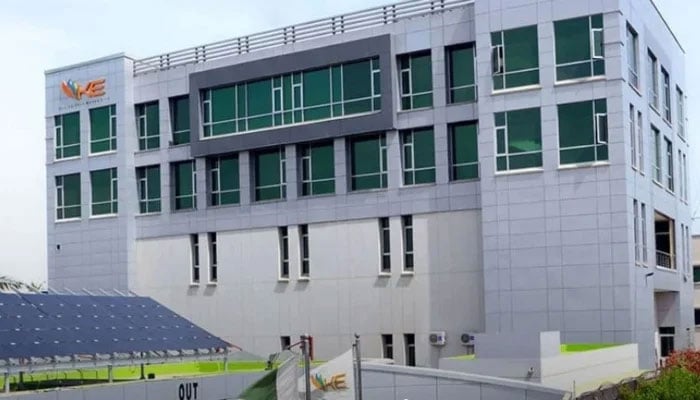Can startups light up Pakistan? Experts weigh in on KE’s innovation drive
KARACHI: K-Electric (KE) is turning to startups to tackle Pakistan's energy challenges, a move praised by experts, though they remain sceptical about how the utility will manage power shortages while staying committed to innovation.
Pakistan’s energy sector faces significant challenges, including an unreliable power supply, deteriorating infrastructure, high tariffs and a growing dependence on imported fossil fuels. In response, KE, the only electric utility for Karachi – Pakistan’s largest city -- and its adjoining areas, has launched EPIC 2025 (Energy Progress & Innovation Challenge). This programme aims to accelerate the development of innovative, practical solutions for the energy sector, building on the success of the company’s 7/11+ innovation challenge from 2022, but with an expanded scope.
Innovators participating in EPIC can either address predefined challenge statements provided by the company or propose their own transformative ideas. A key focus of the EPIC themes is the utilisation of artificial intelligence (AI) in electricity demand forecasting, enhancing grid stability and proactively detecting energy theft to reduce commercial losses.
Other themes in the programme include developing tamper-proof PMT-based loadshedding solutions to enable fairer, more transparent power distribution while protecting paying customers from unnecessary service disruptions. There is also a focus on the utilisation of battery energy storage systems (BESS) to manage system dynamics amid increasing integration of renewable energy. EPIC seeks preemptive detection of transformer failures.
“Since its launch in March 2025, EPIC has successfully positioned itself as a leading platform, fostering collaboration among entrepreneurs, academia, researchers and think tanks dedicated to developing groundbreaking innovations for the energy industry,” the KE said in written responses to The News questions.
The challenge provides innovators with an opportunity to present their ideas to industry experts and receive mentoring sessions to help them enhance the feasibility and scalability of their proposals, it said.
The top three finalists will also receive cash prizes worth over Rs3 million and a potential B2B contract with KE to implement the selected projects, it added.In its statement released last week, KE reported that over 100 local and foreign entities, including research institutes, organisations and academic institutions, expressed significant interest through comprehensive engagement sessions.
“Pakistani startups have shown increasing potential in recent years, particularly in the domains of fintech, agritech, and more recently, cleantech,” says Awais Ashraf, the director of research at AKD Securities Limited.
“With the right mentorship, access to data, regulatory support and opportunities like EPIC, there is definitely scope for local entrepreneurs and innovators to contribute meaningfully to areas such as energy theft detection, renewable energy integration, and predictive maintenance,” Ashraf adds.
He says local examples of fintech innovation include Easypaisa, JazzCash, Safepay, SadaPay and CreditBook. In the agritech space -- where agriculture meets technology -- notable startups include Tazah, Farmdar, PakAgriMarket, Agriday and Crop2X. He believes Pakistani startups are tackling real challenges in finance and agriculture through tech. The success of these ventures also reflects the growing ecosystem that could be leveraged for solving energy sector problems under programmes like EPIC. According to Ashraf, this initiative represents a promising platform for collaborative innovation, and if executed with transparency and consistent stakeholder engagement, it could become a model for utility-led innovation in Pakistan and beyond.
Numerous startups in Pakistan are struggling due to a mix of factors, including difficulties in securing funding, regulatory obstacles, and operational issues. A report from the think tank Invest2Innovate (i2i) indicates that Pakistan’s startup ecosystem has experienced significant fluctuations, with funding peaking at $355 million in 2022, followed by a sharp decline to $74 million in 2023. The downturn continued into 2024, with approximately $37 million raised by November, reflecting both global venture capital challenges and local issues.
KE has faced criticism due to inefficiencies in energy generation amid rising electricity demand, particularly during peak summer months. However, the company claims that since its privatisation, it has doubled its customer base, power consumption, and infrastructure while halving transmission and distribution (T&D) losses. It has invested Rs598 billion in its value chain across distribution, generation, and transmission systems from 2005 to 2022. When it was privatised, it had 1.8 million customers; today, that number has increased to approximately 3.7 million. According to KE’s sustainability report, it has reduced its T&D losses from 34.2 percent in 2005 to 15.99 percent in 2024, with a recovery rate of 91.5 percent. In 2024, KE conducted around 25,000 operations to remove illegal connections (kundas), which weighed approximately 350,000 kg.
KE has set a vision to increase its share of renewable energy (solar and wind) in its generation mix to 30 percent by 2030 to transition to sustainable and green energy in the face of the current climate change issues. As a part of its seven-year investment plan (2023-2030), the company plans to invest an additional Rs372 billion into its value chain to meet a power demand of 5,000 MW for approximately five million customers.
Saad Shah, CEO of Hexalzye Consulting Services, believes energy efficiency, energy conservation, and green energy are the key trends and prevailing challenges in the world these days, which should be addressed at every level through creative ideas, research and development, invention, and innovation etc.
“The role of technology is inevitable in addressing modern challenges to providing affordable solutions to society, particularly in Pakistan, where electricity prices remain at a high level,” Shah says.
According to Dr Noman A Said, a startup coach and CEO of SI Global Solutions, electricity has become a lifeline to fuel industrial growth and overall economic activities, but it must be affordable to businesses of different sizes and all segments of society.
“Clean and green energy is the need of the hour and electricity could play a vital role in replacing other hydrocarbon resources such as natural gas in industries and homes; hence, it is important to make electricity affordable for all in the future and this could be done through a collective role of industries, labs of universities and incubations centers for startups,” Said says.
-
 Cancer-stricken King Charles At Breaking Point?
Cancer-stricken King Charles At Breaking Point? -
 Andrew Leaves King Charles No More Moves To Play: ‘Can’t Just Say We Got Nothing’
Andrew Leaves King Charles No More Moves To Play: ‘Can’t Just Say We Got Nothing’ -
 Sterling K. Brown Explains How Sharing His Kids' Photos On Social Media Can Keep Them Safe
Sterling K. Brown Explains How Sharing His Kids' Photos On Social Media Can Keep Them Safe -
 Keir Starmer Gives Major Advise To King Charles Amid Andrew Scandal
Keir Starmer Gives Major Advise To King Charles Amid Andrew Scandal -
 Nick Reiner Pleads Not Guilty In Famous Parents' Double Murder Which Shocked The World
Nick Reiner Pleads Not Guilty In Famous Parents' Double Murder Which Shocked The World -
 Benicio Del Toro On Losing Mom In Chldhood: 'I’m Still Dealing With It'
Benicio Del Toro On Losing Mom In Chldhood: 'I’m Still Dealing With It' -
 More Than 500,000 Without Power As Blizzard Hits US Northeast
More Than 500,000 Without Power As Blizzard Hits US Northeast -
 Winona Ryder Lands Secret Role In 'Wednesday' Season Three, Marking Reunion With Tim Burton
Winona Ryder Lands Secret Role In 'Wednesday' Season Three, Marking Reunion With Tim Burton -
 Andrew, Fergie’s Life Without The Bells And Whistles Turns Grimmer: ‘A Lot More Was Happening’
Andrew, Fergie’s Life Without The Bells And Whistles Turns Grimmer: ‘A Lot More Was Happening’ -
 Nicole Kidman And Keith Urban's Divorce Drama Deepens As Teen Daughters 'stick' By Their Mother's Side
Nicole Kidman And Keith Urban's Divorce Drama Deepens As Teen Daughters 'stick' By Their Mother's Side -
 William, Kate Desperate To Make Public Statement Distancing Themselves From Andrew
William, Kate Desperate To Make Public Statement Distancing Themselves From Andrew -
 Charli Xcx Details Boozy Second Wedding To The 1975's George Daniel: 'Everyone Was Hungover'
Charli Xcx Details Boozy Second Wedding To The 1975's George Daniel: 'Everyone Was Hungover' -
 Gracie Abrams Follows 'Kylie Jenner Playbook' With Paul Mescal Romance
Gracie Abrams Follows 'Kylie Jenner Playbook' With Paul Mescal Romance -
 Dua Lipa Shares 'Love Letter' With New Boyfriend After Emily Ratajkowski Confirms Romance With Her Previous Beau
Dua Lipa Shares 'Love Letter' With New Boyfriend After Emily Ratajkowski Confirms Romance With Her Previous Beau -
 Brazilian Beauty Influencer Passes Away After Suffering 'medical Emergency'
Brazilian Beauty Influencer Passes Away After Suffering 'medical Emergency' -
 Sarah Ferguson Turns Into A Bulldozer With Beatrice, Eugenie: ‘Help Me Out’
Sarah Ferguson Turns Into A Bulldozer With Beatrice, Eugenie: ‘Help Me Out’




